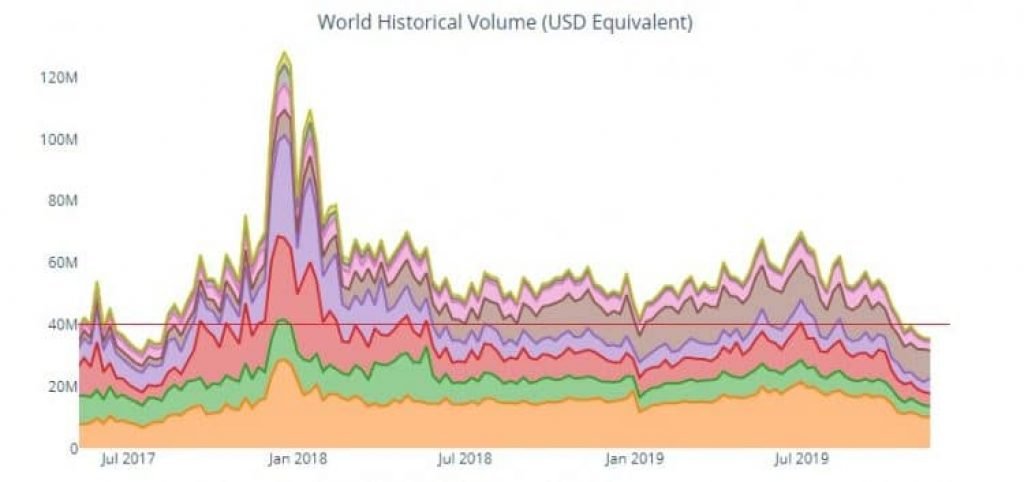2018-11-15 23:11 |
A topic often times discussed throughout the crypto space (and especially in the Bitcoin community) is the topic of scaling. Bitcoin’s scaling issues are pretty well known among the crypto enthusiasts and experts alike and several solutions have been suggested in the past. One of the most popular solutions currently considered and implemented is called SegWit.
The main issue with Bitcoin is its current block size. Having the blocks limited to 1MB restricts the amount of transactions that can be processed by Bitcoin’s blockchain to 7 per second. This significantly limits the commercial appeal of Bitcoin, as it will never become a high-volume transaction chain with such low throughputs.
SegWit protocol was initially created to fix a bug in the Bitcoin code called transaction malleability. The mentioned flaw wasn’t a critical bug, but it was one that prevented implementation of smart contracts and second layer solutions to Bitcoin. SegWit solved this bug by removing the signature information (also known as “witness” information) and storing it outside the base transaction block.
This removal of signature information automatically resulted in the transactions themselves being much less data intensive, which directly lead to more transactions being able to fit inside a single block. By separating the signatures from transactions, SegWit led to Bitcoin blockchain having better throughput due to transactions “weighing less” than before. Using a Segwit enabled wallet can reduce your transaction fee by 50%-70%. Check out this link for a full overview of SegWit soft fork features and benefits.
Even though this piece of technology can significantly improve the Bitcoin blockchain, its adoption hasn’t exactly been taking off. Currently, less than 10% of nodes/wallets out there can say that they have SegWit enabled. This is mostly caused by major centralized services (like Coinbase) failing to implement the technology into their software. Still, there are plenty of wallets out there that do have SegWit enabled and we decided to list them for you down below:
TrezorTrezor is one of the oldest and most reliable Bitcoin/altcoin hardware wallet makers out there. Its Trezor One and Trezor Model T wallets have been among the market standouts for quite some time now in terms of performance, adoption and number of cryptocurrencies supported. Trezor was one of the first projects to implement SegWit and offers fee adjusting capabilities; some feel like its software isn’t the fastest but Trezor is still widely considered among the best and safest hardware wallet options on the market.
Ledger Nano SOne of the most popular hardware wallets out there, Ledger Nano S was also among the first wallets to announce SegWit capabilities. Ledger was always quick to adopt useful blockchain related technology (supporting Bitcoin/Ethereum forks out of the gate) and such was the case with SegWit. Segwit addresses were activated for the Ledger devices on the 24th of August, 2017. The wallet is shaped as a simple USB drive, is simple to transport and connect to the internet and supports a truly wide variety of cryptocurrencies. Similarly to Trezor, it also supports custom fee feature which lets users decide how much satoshis per byte they want to pay.
ElectrumAnother crypto mainstay present on the market for several years (been around since 2011), it’s often cited as the best option for anyone looking for a mobile/desktop wallet. An open source project released under an MIT license, it is a “lightweight” wallet which doesn’t require you to download the entire blockchain to use its functions. Transactions are signed right on the device and no data gets sent out without your notice. Electrum offers built-in SegWit capabilities and also has adjustable fee features. Choosing “SegWit” when setting your Electroneum wallet up will get you a bech32-address (starting with bc1…), which are native-SegWit addresses. The wallet is supported only Android and on Windows, Linux, OSX.
GreenBits/GreenAddressGreenBits was the first wallet to originally implement SegWit features onto its platform. It is an Android-focused wallet, with GreenAddress being its SegWit-enabled desktop and iOS brother. The wallet isn’t that well known but is considered legitimate and secure in the crypto community. The company GreenAddress, responsible for these two projects, offers a lean version of the app on F-Droid for advanced Android users. The wallet can also be downloaded as a Chrome extension which can be used on desktop wallets.
SamouraiA wallet marketing itself as “a modern Bitcoin wallet hand forged to keep your transactions private, your identity masked and your funds secure”. The project is currently in development, and anyone interested in testing the product out can join their Alpha 3 by following this link. Full bech32 and SegWit support were added as a part of the Alpha 3 testing, with BIP49 being fully implemented as well. It uses PaymentNyms technology, is encrypted on mobile devices with the help of the AES-256 encryption and has a secure pin login that allows its users to lock away access to the wallet. Its privacy features excel as it never reuses addresses and also doesn’t leak valuable metadata about you or your transactions.
Bitcoin CoreAs the Bitcoin.org website explains, Bitcoin Core is a full Bitcoin client that builds the backbone of the network: It offers high levels of security, privacy, and stability while having fewer features and it taking a lot of space and memory. It runs on Windows, Linux and Mac OSX and supports SegWit since version 0.13.1. The installation of the wallet is all but modest, as you’ll need at least 145GB of hard disk space to store the full client. Downloading this client also lets your wallet become a Bitcoin blockchain node.
Bitcoin KnotsBitcoin Knots is a full Bitcoin client similar to the Bitcoin Core. Existing since December of 2011, it offers high levels of security, privacy, and stability and helps build and maintain the integrity and security of the Bitcoin blockchain. It includes more advanced (albeit less tested) features than Bitcoin Core and is known for using a lot of space and memory. Its experimental status doesn’t affect its integrity as the wallet has been quite stable throughout its existence. It also supports Windows, Mac OSX and Linux. The source code is open and available to download.
Bitcoin ArmoryArmory is an advanced Bitcoin client suitable for Bitcoin power users. It offers many backup and encryption features, and it allows secure cold-storage on completely air-gapped offline computers. The projects is a work of a cryptography experienced team and offers other strong features such as distributed multi signatures and Identity Verification Specification. The wallet is also SegWit-enabled and can be downloaded for Windows, Linux or Mac.
CoinomiAnother trusted Bitcoin/altcoin wallet which lets its users securely store, manage and exchange Bitcoin, Ethereum, and more than 500 other blockchain assets. It is a mobile-focused wallet which can be downloaded both on Android and iOS devices. Coinomi has integrated instant access to exchanges like Changelly and ShapeShift into its apps. This wallet lets its users customize their transaction fees, offers built-in privacy and anonymity and has one of the better UI’s on the market. Some have an issue with its “closed source” nature which leaves room for potential privacy and trust issues with the wallet.
The post Best Bitcoin Wallets that support SegWit appeared first on CaptainAltcoin.
origin »Bitcoin price in Telegram @btc_price_every_hour
Bitcoin (BTC) íà Currencies.ru
|
|













